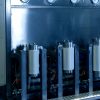Circular economy plays a fundamental role in the development of a sustainable economy. Exenia, born over 20 years ago with the idea of developing sustainable processes, carries out its research and industrial development activity based on green processes in the extraction, fractionation, pasteurization, micronization of compounds from vegetables, as it uses as a solvent and as a carrier, the CO2 captured by the atmosphere in the processes.
In this way the products obtained (extracts, fractionated compounds, micronized solid compounds, etc.) are free of traces of traditional and generally toxic solvents. Furthermore, the environmental impact deriving from these industrial applications is zero in terms of CO2 emissions: a lot of CO2 captured from the environment, in equal measure reintroducing it due to the use of CO2 as a supercritical, non-toxic, non-flammable solvent characterized by low surface tension. The other important commitment of Exenia is the possibility of enhancing vegetable waste. The food industry produces a wide range of by-products still rich in molecules with high added value but difficult to extract.
Exenia’s goal is to identify and extract these molecules to make them a new resource. Furthermore, in extractive processes in supercritical phase, the residual degreased flours after extraction can often be proposed as secondary materials (concept introduced by the circular economy to identify the recirculated material), the basis for high quality products due to the effect of reducing bacterial charge (derived from pasteurization caused by supercritical CO2), the absence of solvent residues, due to the treatment of raw materials at low temperature and to maintain the organoleptic quality due to a non-invasive industrial process. The combination of these two principles, environmental sustainability and circularity in the use of resources, leads Exenia to place itself within a sustainable context of economic development.


